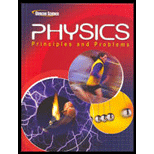
Concept explainers
(a)
To calculate: The frequency perceived by a detector on a stationary train.
(a)
Answer to Problem 48A
The frequency of sound perceived by a detector on a stationary stationis
Explanation of Solution
Given:
Speed of sound in air (
Velocity of train (source) (
Velocity of detector train (
Frequency of wave (
The train is moving away from the detector.
Formula used:
Doppler Effect equation:
Where
Calculation:
As per problem,
The train is moving away from the detector, so
Now put the value of
Conclusion:
Thus, the frequency perceived by the detectoris
(b)
To calculate:The frequency perceived by a train moving away from the source train.
(b)
Answer to Problem 48A
The frequency perceived by the train moving away from the source train is
Explanation of Solution
Given:
Speed of sound in air (
Velocity of train (source) (
Velocity of detector train (
Frequency of wave (
Both the trains are moving in opposite direction from each other.
Formula used:
Doppler Effect equation:
Where
Calculation:
As per problem,
The source train is moving away from the detector, so
The detector train is also moving away from the source train, so
Now put the value of
Conclusion:
Thus, the frequency perceived by the detector train is
Chapter 15 Solutions
Glencoe Physics: Principles and Problems, Student Edition
Additional Science Textbook Solutions
Essential University Physics: Volume 2 (3rd Edition)
College Physics: A Strategic Approach (3rd Edition)
College Physics (10th Edition)
Sears And Zemansky's University Physics With Modern Physics
Physics: Principles with Applications
Conceptual Physics (12th Edition)
 College PhysicsPhysicsISBN:9781305952300Author:Raymond A. Serway, Chris VuillePublisher:Cengage Learning
College PhysicsPhysicsISBN:9781305952300Author:Raymond A. Serway, Chris VuillePublisher:Cengage Learning University Physics (14th Edition)PhysicsISBN:9780133969290Author:Hugh D. Young, Roger A. FreedmanPublisher:PEARSON
University Physics (14th Edition)PhysicsISBN:9780133969290Author:Hugh D. Young, Roger A. FreedmanPublisher:PEARSON Introduction To Quantum MechanicsPhysicsISBN:9781107189638Author:Griffiths, David J., Schroeter, Darrell F.Publisher:Cambridge University Press
Introduction To Quantum MechanicsPhysicsISBN:9781107189638Author:Griffiths, David J., Schroeter, Darrell F.Publisher:Cambridge University Press Physics for Scientists and EngineersPhysicsISBN:9781337553278Author:Raymond A. Serway, John W. JewettPublisher:Cengage Learning
Physics for Scientists and EngineersPhysicsISBN:9781337553278Author:Raymond A. Serway, John W. JewettPublisher:Cengage Learning Lecture- Tutorials for Introductory AstronomyPhysicsISBN:9780321820464Author:Edward E. Prather, Tim P. Slater, Jeff P. Adams, Gina BrissendenPublisher:Addison-Wesley
Lecture- Tutorials for Introductory AstronomyPhysicsISBN:9780321820464Author:Edward E. Prather, Tim P. Slater, Jeff P. Adams, Gina BrissendenPublisher:Addison-Wesley College Physics: A Strategic Approach (4th Editio...PhysicsISBN:9780134609034Author:Randall D. Knight (Professor Emeritus), Brian Jones, Stuart FieldPublisher:PEARSON
College Physics: A Strategic Approach (4th Editio...PhysicsISBN:9780134609034Author:Randall D. Knight (Professor Emeritus), Brian Jones, Stuart FieldPublisher:PEARSON





